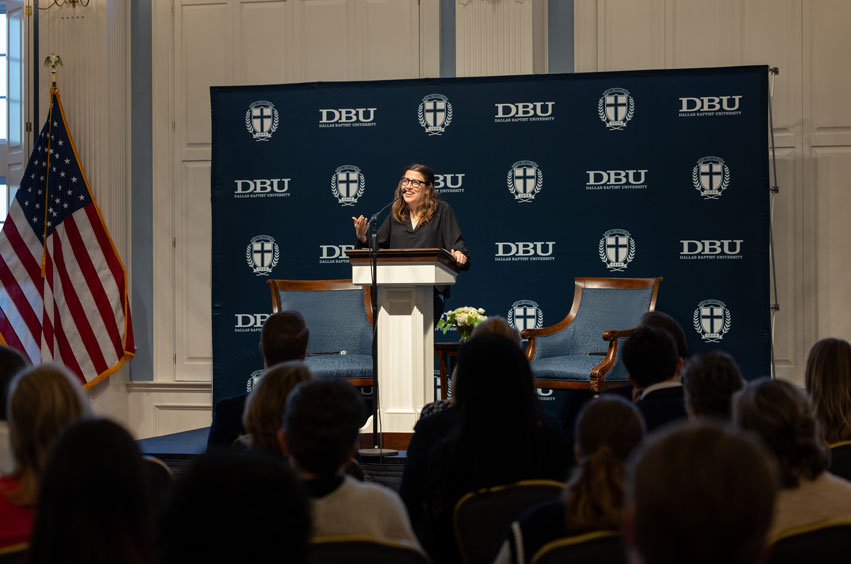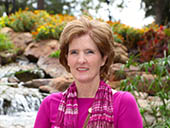DBU Hosts Tish Harrison Warren for Veritas Lecture Series
This article is over six months old and may reference former titles for DBU faculty or staff, discontinued programs, or other details that have since changed. If you have any questions, please contact us at news@dbu.edu, or (214) 333-5172.

On the evening of March 19, Dallas Baptist University was honored to host Tish Harrison Warren at the latest Veritas lecture series as a part of the Institute for Global Engagement.
The event began with a brief introduction from the Executive Director for the Institute for Global Engagement, Jonathan Fechner, followed by an opening prayer from the DBU President, Dr. Adam C. Wright.
Tish Harrison Warren was invited to speak about her book, Liturgy of the Ordinary: Sacred Practices in Everyday Life, which explores how a follower of Christ should seek Him during the woes of our daily routines. She began her lecture by looking back at the release of this book in 2016. Liturgy of the Ordinary is her most successful book, still selling today. So, Tish began to wonder why this book continues to resonate with people many years later. What's drawing people in?
As Tish pondered this question, she zeroed in on the concept of liturgy, the habitual order in which we worship. On a day-to-day basis, worshiping the Lord can look somewhat dull. Our days can be busy, mundane, and repetitive. How do we seek the Lord in these seasons? She sought to answer this question in her book as she noticed believers were actively struggling with this because they yearned for something bigger than themselves. Tish explained, "I think people, especially younger people, crave rootedness instead of consumerism. They crave something solid because consumerism is not a big enough story to support the soul." Everyone wants a big, radical story about how God redeemed "the worst of thee." However, more often than not, we believe that our stories are small and insignificant compared to radical testimonies when, in reality, all testimonies are radical and significant.
Tish uncovered that people are constantly desperate to be a part of a bigger story. People align with social causes, political parties, and celebrity fan groups simply to identify with something bigger than themselves that will last beyond them. While writing this book, Tish was encouraged that young believers seemingly had a renewed interest in liturgy. She saw that people were fascinated by ancient things like liturgy because it is so countercultural to our world, which is plagued by consumerism. "Consumerism eats everything—even Christian worship. Liturgy has been a balm to people because it resists consumerism."
Tish also realized that people are starting to crave formation in addition to information. Information overload rules our society today. A wealth of knowledge and infinite new information is accessible to us at any moment of the day, leading to unlimited distractions. This distraction-riddled, information-saturated age has only made discipleship increasingly difficult. Tish explained the tendency of modern believers to view Christianity as "putting the right ideas into everyone's heads." Several years ago, Tish and her husband attended seminary together and were devoted to studying God's word day and night. Despite knowing all the right things, Tish and her husband were disconnected in their marriage. Having the information did not solve their problems. The good information in their heads was not actively changing their hearts because information alone is insufficient.
Tish illustrated that habits are reflections of our hearts. She recounted a few years ago that she committed to leaving her phone outside her bedroom at night so that it would no longer be the first thing she interacted with each morning. This small change to her routine did not radically change her life. She didn't magically become a better wife, mother, or Christian. However, this change caused her to think more actively about things. She realized that she had unconsciously built up a resistance to boredom. "I want us to notice that when I reached for my phone in the morning, Apple did not care what I confessed. They never asked me to devote my allegiance to them. They are happy no matter what I say as long as I keep using my phone. They aim for something lower than my mind—my body and habits. At this point, technology companies understand human formation much better than the church does."
Tish's final theory about the continued interest in Liturgy of the Ordinary is that people crave incarnation instead of abstraction. She noted that there is a particular temptation in history to favor abstraction. People can spout praises about our world yet hate their neighbor. People are unified within their online communities but divided in real life. Tish explained that excarnate faith resists incarnation. This excarnate faith sits high in the sky where Christian faith becomes a disembodied concept instead of an everlasting, transformational, daily walk with Christ. Tish expanded on her point, "The incarnation of Jesus we celebrate every Christmas dealt a death blow to any spirituality that is abstracted. We don't serve a God who is far away, but we serve a God who is involved in the ordinary. He walked with us and loved His neighbors. Jesus' ordinary years are as much a part of our redemption story as his ministry years."
Tish explained that Christ assumed human life for 33 years. If his only mission on earth were to die, those 33 years wouldn't have been necessary. Instead, Christ's mission was to grab hold of us and reorient us to the Father. He assumed all of life and took on total humanity, including the mundane and ordinary. "No task is too small or routine to deflect God's glory."
The event continued with a moderated discussion featuring the CEO of Denison Ministries and Senior Fellow for Cultural Studies with the IGE, Dr. Jim Denison. Dr. Denison asked Tish to explain how Christians can purposely make their lives more liturgical. Tish said the temptation to separate our lives into secular and spiritual sectors is a lie from the enemy. She recounted a snippet from her testimony about how she grew up in an era where being radical and on fire for the Lord was expected and encouraged. Being a "world-changer" was all the rage when Tish was young. Then, suddenly, she found herself in her thirties, with no idea what it looked like to follow Jesus in everyday life. She became fascinated with the question: "Why does daily life matter?" This question shaped the development of the Liturgy of the Ordinary. Tish pointed out the modern tendency for people to denounce old American evangelicalism, which causes them to embrace progressivism. She rejects both of those ideas and encourages people to look to the ancient traditions that people practiced, worshiping our same God centuries ago.
Lastly, Dr. Denison asked Tish to share about her time as a writer for The New York Times. She said she was hesitant to accept the job at first because she felt called to serve the church, but one of her friends and mentors encouraged her that the church needs to know how to speak and relate to the culture. For nearly two years, Tish wrote for The New York Times weekly. She received hundreds of responses each week and had to stay off social media to avoid the controversy and ridicule. She was constantly debating about faith and theology. "When God becomes an abstraction that you debate about more than you sit at His feet and are with Him, then your soul is in danger. We must fight against God becoming an idea and encounter the real, living God."
Dr. Denison prayed to conclude the event, and Dr. Wright provided closing remarks. He thanked Tish for her influence and blessing the DBU Family with her insight and wisdom.
Tish Harrison Warren is a priest in the Anglican Church in North America. She is the author of Liturgy of the Ordinary: Sacred Practices in Everyday Life (Christianity Today's 2018 Book of the Year) and Prayer in the Night: For Those Who Work, or Watch, or Weep (Christianity Today's 2022 Book of the Year and the 2022 ECPA Christian Book of the Year). For over a decade, Tish has worked in ministry settings as a campus minister with InterVarsity Graduate and Faculty Ministries, as an associate rector, and with addicts and those in poverty through various churches and non-profit organizations. She is a founding member of The Pelican Project and a Senior Fellow with The Trinity Forum. She lives with her husband and three children in Austin, Texas. Tish was a weekly newsletter writer for The New York Times and was a columnist for Christianity Today. Her articles and essays have appeared in Religion News Service, Christianity Today, Comment Magazine, The Point Magazine, The New York Times, and elsewhere.
Cameron Billings was the Assistant Director of Media and Public Relations in University Communications at Dallas Baptist University.








